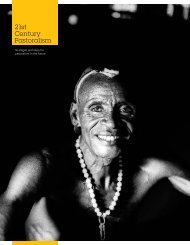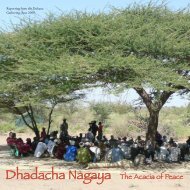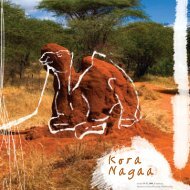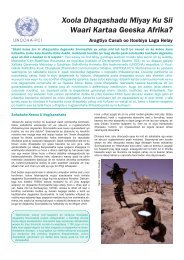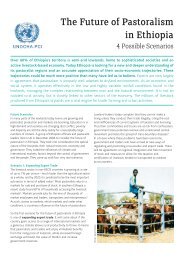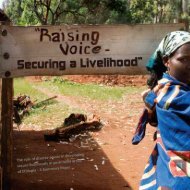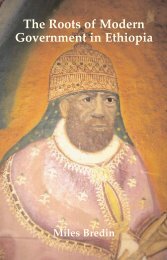Download PDF (1.47Mb) - the Website of the Pastoralist ...
Download PDF (1.47Mb) - the Website of the Pastoralist ...
Download PDF (1.47Mb) - the Website of the Pastoralist ...
Create successful ePaper yourself
Turn your PDF publications into a flip-book with our unique Google optimized e-Paper software.
ABOUT<br />
THE KARAMOJA<br />
RESEARCH<br />
6. Researching in <strong>the</strong> settlements and Kraals<br />
Method<br />
The team found people, provoked discussions, asked questions, and recorded material using <strong>the</strong> three principles:<br />
Respect: Discussing <strong>the</strong> topic with people, introducing who <strong>the</strong> researchers are, <strong>the</strong>ir purpose, <strong>the</strong>ir learning so<br />
far, being polite and answering as well as asking questions.<br />
Openness: Allowing <strong>the</strong> people <strong>the</strong>y interviewed to influence <strong>the</strong> direction <strong>of</strong> <strong>the</strong> discussion, its focus and its<br />
most important points. Taking an interest in how one person’s points are different from those <strong>of</strong> o<strong>the</strong>rs or those<br />
<strong>of</strong> <strong>the</strong> researcher, <strong>the</strong>y avoided judging people, or rejecting <strong>the</strong>ir point <strong>of</strong> view or decisions as less valuable.<br />
Listening: Paying attention to words, gestures and surroundings, sticking to <strong>the</strong> topic firmly, feeding back what<br />
has been heard (this is what I heard you say. Am I right?) and asking clarifying questions, (can you tell me more?).<br />
“To listen well you should watch people’s eyes and lips…”<br />
Meeting people, seeing places and recording<br />
The researchers agreed on face-to-face discussions with individuals, or twos or threes as <strong>the</strong>y encountered <strong>the</strong>m.<br />
They discussed how to find different kinds <strong>of</strong> people when <strong>the</strong>y were in <strong>the</strong> settlements and kraals, before <strong>the</strong>y<br />
went <strong>of</strong>f herding, or when <strong>the</strong>y came back from market. They spent some time working out how to approach<br />
people well and how to ask a few open questions to stimulate discussion. Each team had one digital camera and<br />
three voice recorders. They decided how <strong>the</strong>y would take photographs and record conversations.<br />
In each parish <strong>the</strong> team divided into two sub-teams <strong>of</strong> six people. Each sub-team went to a different place. They<br />
introduced <strong>the</strong>mselves to <strong>the</strong> village leader or local administrator. The pairs went in search <strong>of</strong> young people<br />
and greeted <strong>the</strong>m. They gave snuff as a traditional gift. They greeted mo<strong>the</strong>rs and older people with particular<br />
respect. They spent a little time chatting and helping those <strong>the</strong>y met with whatever work <strong>the</strong>y were doing. Then<br />
<strong>the</strong>y asked <strong>the</strong>ir questions politely: ‘how are you making a living?’ ‘What makes it good?’ They asked people to<br />
tell stories from <strong>the</strong>ir lives.<br />
Some people <strong>the</strong>y met hoped for payment, while o<strong>the</strong>rs were at first unwilling to engage. But <strong>the</strong> researchers<br />
made efforts to make friends and in most cases <strong>the</strong>y were successful. They explained that <strong>the</strong>y were also<br />
young Karimojong and not from outside. They used <strong>the</strong> principles <strong>the</strong>y had agreed: respect, openness and<br />
listening. They were careful not to make promises <strong>the</strong>y could not keep, promising only to return with <strong>the</strong> book<br />
<strong>of</strong> <strong>the</strong> research.<br />
The team recorded 378 interviews and stories on voice recorders, to hear people’s voices. Every third day elder,<br />
John Logwee, joined <strong>the</strong>m for a day <strong>of</strong> analysis in Moroto town. Toge<strong>the</strong>r <strong>the</strong>y discussed and analysed what <strong>the</strong>y<br />
had heard and seen, improving <strong>the</strong>ir approach and questions. They wrote <strong>the</strong> most arresting stories into<br />
record books and reviewed photographs.<br />
- 13 -



